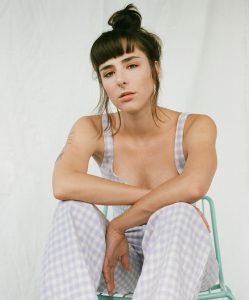Medium Plaisir, the Québec City singer-songwriter and guitarist’s first album, has finally made it to our ears, after a long and formative journey through various competitions – such as Petite-Vallée, Cabaret Festif! de la Relève, Festival international en chanson de Granby, and a third place win during the finals of the 2020 Francouvertes (where Valence ended up the winner).
 “Competitions are an opportunity, but they can be insidious,” says Roy. “It screws with your ego and your confidence, like at the Francouvertes, where judges are right in front, and they’re taking notes. It’s hard, and it’s a test of humility.”
“Competitions are an opportunity, but they can be insidious,” says Roy. “It screws with your ego and your confidence, like at the Francouvertes, where judges are right in front, and they’re taking notes. It’s hard, and it’s a test of humility.”
Listening to the 24-year-old musician’s dozen new songs reveals an album that feels like a huge breath of fresh air; an incarnation of pop purity before which one can only bow. Her song “Ta Main” was the Révélation Radio-Canada 2021–2022, and Roy was selected as one of SOCAN’s six artists to watch, and chosen as a finalist for the Francophone side of the SOCAN Songwriting Prize. It also won the Slaight Music Emerging Songwriter Award, presented by the Canadian Songwriters Hall of Fame. In other words, she’s well on her way to a successful career. Her management has been taken on by La Maison Fauve.
“By getting involved in the co-production (with guitarist Dominique Plante) of this project, I learned a lot and made great strides in my career,” says Roy. “On a more human aspect, being confronted with my limits, and letting go of certain aspects, is still a work in progress. Focusing on the right thing, and not asking constant questions… Sometimes we have blinders on, we become obsessed with what we’re doing, and it becomes a little alienating. It takes us away from the creative goal.”
Alexandre Martel (Anatole, Mauves), who co-produced Hubert Lenoir’s Darlène, flew in at the end of the process to impart a few pieces of advice. “He put his finger right on what worked and what didn’t,” says Roy. “Is the song still good? Is it just me who can’t stand it any longer? These songs offer extreme scrutiny of who I am. I started writing them at the beginning of the pandemic, and because there was so little going on around me, I was forced to reach deep inside myself to express urgent things. Certain passages, however, are pure fiction. Things are magnified like that, because at any given moment my life isn’t necessarily interesting enough that it makes it to my diary.
“Making an album can be exacting,” she continues. “We recorded all last summer at Le Nid studio in St-Adrien, and we refined all fall the demos at Dominique’s. We asked ourselves so many questions. We flipped songs completely, felt like dropping some to write new ones; those were five very intense days, but I loved it!”
Roy’s musical palette is quite stunning. Medium Plaisir is an album whose depth doesn’t diminish with multiple plays. It was meticulously crafted. Just as on her Avalanche EP, the modus operandi is often the same: a soft beginning, with a beefier orchestration that comes in about mid-way, and a conclusion replete with satin-soft backing vocals, and melodies that co-exist alongside frenzied cascades of guitars. “We really had a lot of fun,” she says. “I love beginning small and just building and building by adding different sounds.”
She also loves vocal harmonies and choirs, and make no bones about it. “It takes up a lot of space in my musical project,” says Roy. “I’ve always been drawn to that. Hence the presence of Lou-Adriane Cassidy and Odile Marmet-Rochefort.”
Roy has the typical spunk of people her age, and the tools to write songs with hypnotic power, or evanescent ballads composed of a few notes – as evidenced by “Automne,” “Miracle,” and “Ce n’est pas de la chance.” Or by the glittering dialogue between her riffs, and vocals that climb high to the sky, while her accompanists are entirely at her service.
“Apprendre encore,” arguably Medium Plaisir’s best song (in my humble opinion), immediately sinks its hooks in, thanks to its piano lines. It’s the type of song that could easily make it to the silver screen. “We fine-tuned it for three whole days,” says Roy. “When I came home that night, I poured a glass of wine and wondered what I was going to write for that music. For me it is a song of anger in affirmation. There’s a layer of self-deprecation and humility that’s, like, ‘This is who I am.’ It talks about the journey, and learning, and it betrays my age.”